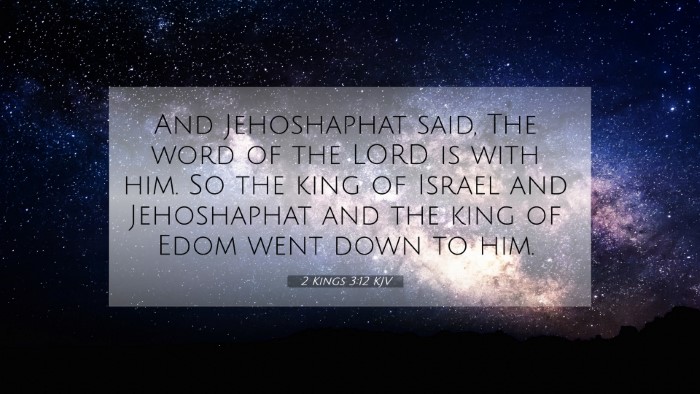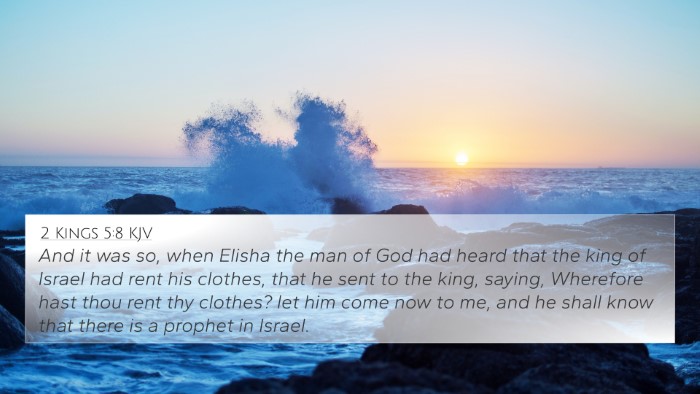Understanding 2 Kings 3:12
2 Kings 3:12 states, "And Jehoshaphat said, The word of the Lord is with him. So the king of Israel and Jehoshaphat and the king of Edom went down to him." This verse comes amid a narrative illustrating the kings' reliance on the prophetic word of God during a dire situation. Below, we will examine the insights from various public domain commentaries, namely Matthew Henry, Albert Barnes, and Adam Clarke.
Contextual Overview
This verse occurs during a military campaign against Moab, where King Jehoram of Israel, King Jehoshaphat of Judah, and the king of Edom found themselves in a perilous state. They seek the counsel of the prophet Elisha, who embodies the presence of God's word and guidance in their time of need.
Commentary Insights
- Matthew Henry: Henry emphasizes the importance of recognizing God's prophets as bearers of His word. Jehoshaphat's acknowledgment of Elisha demonstrates a unity of purpose among the kings in seeking divine guidance. The reference to "the word of the Lord" suggests that true counsel comes from God alone, and not from worldly wisdom.
- Albert Barnes: Barnes focuses on the role of Jehoshaphat as a spiritual leader. His affirmation that "the word of the Lord is with him" conveys a sense of confidence in prophetic authority, serving as a reminder that spiritual leaders should guide others toward seeking divine insight in crucial times. This sets a precedent for valuing prophetic wisdom in national matters.
- Adam Clarke: Clarke adds depth by discussing the consequences of ignoring God’s voice through His prophets. The plight of the kings underlines their desperation, and their turn to Elisha reinforces God's ongoing relationship with Israel despite their failings. Clarke points out the idea that God will guide those who seek Him earnestly.
Theological Implications
This verse presents profound implications regarding leadership and divine guidance. It illustrates the necessity of turning to God in moments of crisis and the essential role of prophetic voices in discerning divine purpose. The themes of humility and dependence on God's wisdom are paramount.
Bible Verse Cross-References
- 2 Chronicles 20:20: Jehoshaphat encourages the people to believe in the Lord and His prophets for success.
- 1 Samuel 3:19: The Lord was with Samuel and did not let any of his words fall to the ground, illustrating the reliability of God’s prophets.
- 2 Kings 2:15: The sons of the prophets recognize Elisha’s prophetic calling, reflecting continued divine guidance.
- Romans 10:17: Faith comes by hearing, and hearing by the word of God, emphasizing the necessity of prophetic insight.
- Isaiah 30:21: God promises guidance, indicating that His words provide direction and clarity.
- James 1:5: Encourages believers to seek wisdom from God, who gives generously to all without reproach.
- Micaiah's prophecy in 1 Kings 22:14: A parallel episode of seeking divine wisdom in the context of leadership decisions.
Thematic Bible Verse Connections
The theme of seeking divine counsel is prevalent throughout scripture. Connecting 2 Kings 3:12 to various passages reveals a rich tapestry of God’s guidance:
- God’s Call for Wisdom: Proverbs 2:6 reminds us that the Lord gives wisdom, emphasizing the vital role of divine insight.
- Unity in Seeking God: Matthew 18:20, where two or three gather in Christ’s name, further captures the theme of communal reliance on divine wisdom.
- Authority of Prophets: Hebrews 1:1-2 contrasts the way God spoke in the past through prophets to the ultimate revelation through Christ.
- Divine Covenant: Deuteronomy 18:18 speaks of God raising up a prophet from among the people, underscoring the importance of prophetic leadership.
Conclusion
2 Kings 3:12 is a significant verse that illustrates the importance of divine guidance through prophetic voices in times of crisis. By turning to God and His messengers, the kings exemplify the model for leaders and believers alike, seeking deep and abiding wisdom beyond human understanding. Through cross-referencing and thematic analysis, we can draw parallels across the scriptures that emphasize the ongoing relevance of divine counsel in our lives. This verse, and the insights derived from it, invite us to reflect on our own methods of seeking God in our decisions and crises.











